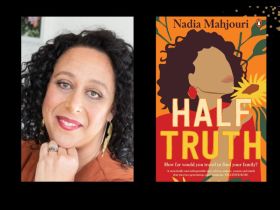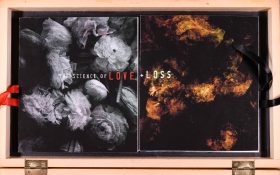Cover art from Anna Burns’ Milkman (detail).
From the mid-1960s to 1998, Northern Ireland was wracked by a vicious civil war between Protestants and Catholics; between those wanting to be part of Great Britain and those who did not. It was not helped that from 1972 the country was occupied by the British army, which did worse than just fail to keep the peace. This period is referred to as ‘the Troubles’, and it is in the middle of those troubled times that Anna Burns’ fictional 18-year-old heroine, who describes herself as ‘maybe-girlfriend’, tells her story.
Maybe-girlfriend tells us what she does and what she thinks and what happens in her community with equal eloquence, passion and conviction for the commonplace and the important. She is both innocent and experienced, simple and complicated, silly and wise, careful and careless. She has the gift of the gab and a dangerous streak of independence in a society where conformity is overvalued.
In maybe-girlfriend, Burns has created a fascinating character. While the story is written in the unmistakable voice of a young woman, the language borders on the poetic and cries to be read aloud, such as when maybe-girlfriend comments on her feelings for the young man she refers to as maybe-boyfriend: ‘If we were in a proper relationship and I did live with him and was officially committed to him, first thing I would have to do is to leave.’
Burns uses maybe-girlfriend to describe what it was like for ordinary people, in particular women, to live during a very difficult time in Northern Island’s recent history. Although this is a work of fiction, the events, so well narrated, come across as actually having happened – which they probably did in one way or another. After all, Burns herself says in an interview that to write this novel, she drew on her own experiences growing up in what she called ‘a place that was rife with violence, distrust and paranoia’.
Maybe-girlfriend is stalked by the milkman, a powerful married man. While she rejects him, discourages him and has nothing to do with him, rumour says otherwise and for the local community this rumour, as with many others, becomes the truth. So it is not surprising that maybe-girlfriend recounts: ‘that it was best not to open my mouth in the interests of truth except to a trusted few persons … so that by age eighteen … it had got to the point where there was only one remaining trusted-fewest person left for me to have faith in in all the world.’
Because Milkman won the Booker Prize, it came under intense critical scrutiny by reviewers and has been labelled ‘challenging’, ‘complicated’, ‘eccentric’, ‘odd’ and ‘baffling’. There is no doubt that the writing style is unusual, with few paragraph breaks, no wasted words and detours into important ethical issues. Much of what the novel conveys is by implication, leaving the reader to make up their own mind as to what is really going on. This is exemplified by describing third brother-in-law as a person who ‘never gossiped, never came out with lewd remarks or sexual sneers or sneers about anything. Nor did he ask manipulative, nosey questions.’ What does that say about the other men in maybe-girlfriend’s life?
This is an extraordinary novel. It is challenging only in the sense that it deals with important issues. It is complicated because if ever there was a complicated situation, it was Northern Ireland during the Troubles. If Milkman is eccentric or odd it is because its writing style is unconventional. The novel is not baffling but the harm it describes human beings doing to each other most certainly is. You will be richly rewarded by reading Milkman.
5 stars: ★★★★★
By Anna Burns
Faber & Faber, 2018
Paperback, 360 pages, $29.99 RRP





